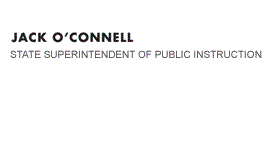Official Memorandum Issued 11/05/2010


Official Letter
Official Letter
November 5, 2010
Dear County and District Superintendents, Special Education Local Plan Area Directors, Special Education Administrators at County Offices, Charter School Administrators, Principals, and Nonpublic School Directors:
UPDATE: ENSURING THE CONTINUOUS DELIVERY OF MENTAL HEALTH SERVICES TO STUDENTS WITH DISABILITIES
You may be aware that the Federal United States District Court for the Central District of California issued a Temporary Restraining Order (TRO) [Case No. 2-CV-10-07956-GW (AGRx)] on November 1, 2010. This TRO requires Los Angeles County Office of Education (LACOE) to disburse its share of the statewide $76 million in federal funds to Los Angeles County Department of Mental Health (LACDMH) for the purpose of providing educationally-related mental health assessments and services to eligible special education students upon referrals by local educational agencies. Further, the TRO specifies that these funds must be used according to the interagency agreement that existed between LACOE and LACDMH prior to the Governor’s October 8, 2010 veto of the 2010–11 appropriation for educationally-related mental health services mandated by Assembly Bill (AB) 3632.
In keeping with how funds have been dispersed in the past, the California Department of Education (CDE) prepared and sent Grant Award Notifications to County Offices of Education that allocated $76 million in federal funds to contract, on behalf of Special Education Local Plan Areas (SELPA) in their counties, with the appropriate mental health agency to provide specified mental health services. We anticipate that these funds will provide urgent relief to ensure that students receive needed services via existing interagency agreements in accordance with state and federal law [Chapter 26.5 of Division 7 of the California Government Code sections 7570-7590, 34 Code of Federal Regulations (CFR) 300.704(b)(4)(iii)] .
The TRO gives substance to the CDE’s belief that county mental health (CMH) agencies remain responsible for carrying out their requirements to serve students with disabilities who are eligible to receive services under AB 3632 provisions and your local interagency agreements. In my previous communication with you, I provided the relevant legal citations for your reference. I also informed you that the CDE is contemplating serious action, up to and including all available administrative and judicial actions, if necessary.
The CDE’s primary interest and responsibility is to ensure that the special education and related services documented in a child's individualized education program (IEP) are provided by the responsible parties. Continuation of services is vital while the specifics of funding are resolved either through the courts or through legislative action.
I encourage you to continue making appropriate student referrals to your local CMH agency. The CMH agency is required to then determine whether the referral is appropriate and, if so, to complete the assessment, develop a written report, review the report at an IEP meeting, and make a recommendation about whether the student requires mental health services. If the CMH agency representative recommends that the student receive AB 3632 services then by agreement of the student's IEP team, the services are included in the student's IEP. The services cannot be removed from the IEP without mutual agreement of the CMH agency, the local educational agency (LEA), and the student's parents or guardians, or by judicial order.
Many CMH agencies have continued to operate in a manner that comports with their requirements under various federal and state statutes. However, some CMH agencies have notified LEAs that they will not continue to provide their required services because they believe that the suspension of the mandate is valid or because the Governor’s veto of the specific funding earmarked for mental health services makes it difficult for them to do so. The CDE will continue to investigate and enforce corrective actions for any violations of state and federal laws and regulations pertaining to students with disabilities.
There are several potential courses of action for LEAs should CMH agencies decline to meet their responsibilities. The proper course of action in your particular instance should be discussed with your legal counsel. Pending all actions, LEAs must continue to refer appropriate students to CMH agencies, and if students are currently receiving CMH services, LEAs must ensure that students continue to receive all IEP services that were being provided by CMH agencies before the Governor’s veto. Such services include counseling and paying for the cost of a residential placement.
LEAs should follow the interagency dispute resolution process as mandated in Government Code Section 7585 et. seq. when CMH agencies refuse to provide IEP-related AB 3632 services. This process requires the LEA to submit a written complaint to the Superintendent of Public Instruction and/or the Secretary of the California Health and Human Services Agency. The complaint should allege the failure of the CMH agency to provide a service to a specific student. This process could be used, for instance, if the CMH agency is continuing to provide mental health services to a student, but is not sending representatives to the student's IEP meeting. The interagency dispute resolution process is also appropriate if the CMH agency refuses to attend an IEP meeting to discuss placing a student in a residential placement. Before LEAs file an action in court against a CMH agency, the LEA must first avail itself of its administrative remedies.
I advise LEAs to inform their student's parents and guardians that although the LEA cannot control the actions of a CMH agency, parents and guardians have the right to file a request for a due process hearing against the CMH agency. In addition, a student's parents or guardians may file a special education due process complaint and name either or both the CMH agency and the LEA as parties to the complaint.
The CDE representatives will continue to meet with legislative staff to determine a resolution to the veto of the state funding for these important services, and we will provide updated information to you as it becomes available.
If you have any general questions regarding this subject while we work toward a more permanent solution, please contact the Special Education Division by email at SPI@cde.ca.gov.
Sincerely,
Original signed by Fred Balcom. Hard copy of the signed document is available by contacting the Special Education Division's Director's Office at 916-445-4602.
Fred Balcom, Director
Special Education Division
